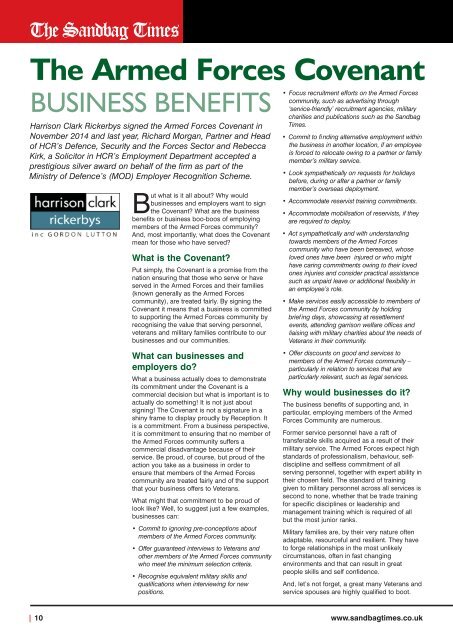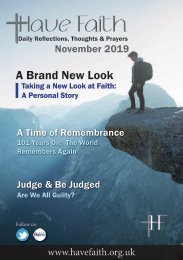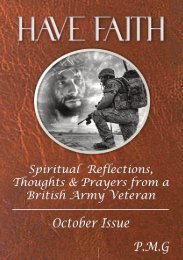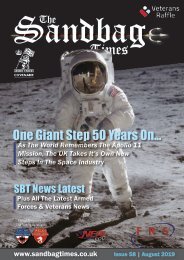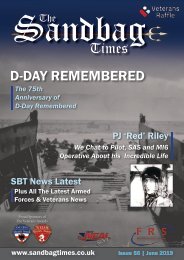The Sandbag Times Issue No: 34
The Veterans Magazine
The Veterans Magazine
Create successful ePaper yourself
Turn your PDF publications into a flip-book with our unique Google optimized e-Paper software.
Harrison Clark Rickerbys signed the Armed Forces Covenant in<br />
<strong>No</strong>vember 2014 and last year, Richard Morgan, Partner and Head<br />
of HCR’s Defence, Security and the Forces Sector and Rebecca<br />
Kirk, a Solicitor in HCR’s Employment Department accepted a<br />
prestigious silver award on behalf of the firm as part of the<br />
Ministry of Defence’s (MOD) Employer Recognition Scheme.<br />
But what is it all about? Why would<br />
businesses and employers want to sign<br />
the Covenant? What are the business<br />
benefits or business boo-boos of employing<br />
members of the Armed Forces community?<br />
And, most importantly, what does the Covenant<br />
mean for those who have served?<br />
What is the Covenant?<br />
Put simply, the Covenant is a promise from the<br />
nation ensuring that those who serve or have<br />
served in the Armed Forces and their families<br />
(known generally as the Armed Forces<br />
community), are treated fairly. By signing the<br />
Covenant it means that a business is committed<br />
to supporting the Armed Forces community by<br />
recognising the value that serving personnel,<br />
veterans and military families contribute to our<br />
businesses and our communities.<br />
What can businesses and<br />
employers do?<br />
What a business actually does to demonstrate<br />
its commitment under the Covenant is a<br />
commercial decision but what is important is to<br />
actually do something! It is not just about<br />
signing! <strong>The</strong> Covenant is not a signature in a<br />
shiny frame to display proudly by Reception. It<br />
is a commitment. From a business perspective,<br />
it is commitment to ensuring that no member of<br />
the Armed Forces community suffers a<br />
commercial disadvantage because of their<br />
service. Be proud, of course, but proud of the<br />
action you take as a business in order to<br />
ensure that members of the Armed Forces<br />
community are treated fairly and of the support<br />
that your business offers to Veterans.<br />
What might that commitment to be proud of<br />
look like? Well, to suggest just a few examples,<br />
businesses can:<br />
• Commit to ignoring pre-conceptions about<br />
members of the Armed Forces community.<br />
• Offer guaranteed interviews to Veterans and<br />
other members of the Armed Forces community<br />
who meet the minimum selection criteria.<br />
• Recognise equivalent military skills and<br />
qualifications when interviewing for new<br />
positions.<br />
• Focus recruitment efforts on the Armed Forces<br />
community, such as advertising through<br />
‘service-friendly’ recruitment agencies, military<br />
charities and publications such as the <strong>Sandbag</strong><br />
<strong>Times</strong>.<br />
• Commit to finding alternative employment within<br />
the business in another location, if an employee<br />
is forced to relocate owing to a partner or family<br />
member’s military service.<br />
• Look sympathetically on requests for holidays<br />
before, during or after a partner or family<br />
member’s overseas deployment.<br />
• Accommodate reservist training commitments.<br />
• Accommodate mobilisation of reservists, if they<br />
are required to deploy.<br />
• Act sympathetically and with understanding<br />
towards members of the Armed Forces<br />
community who have been bereaved, whose<br />
loved ones have been injured or who might<br />
have caring commitments owing to their loved<br />
ones injuries and consider practical assistance<br />
such as unpaid leave or additional flexibility in<br />
an employee’s role.<br />
• Make services easily accessible to members of<br />
the Armed Forces community by holding<br />
briefing days, showcasing at resettlement<br />
events, attending garrison welfare offices and<br />
liaising with military charities about the needs of<br />
Veterans in their community.<br />
• Offer discounts on good and services to<br />
members of the Armed Forces community –<br />
particularly in relation to services that are<br />
particularly relevant, such as legal services.<br />
Why would businesses do it?<br />
<strong>The</strong> business benefits of supporting and, in<br />
particular, employing members of the Armed<br />
Forces Community are numerous.<br />
Former service personnel have a raft of<br />
transferable skills acquired as a result of their<br />
military service. <strong>The</strong> Armed Forces expect high<br />
standards of professionalism, behaviour, selfdiscipline<br />
and selfless commitment of all<br />
serving personnel, together with expert ability in<br />
their chosen field. <strong>The</strong> standard of training<br />
given to military personnel across all services is<br />
second to none, whether that be trade training<br />
for specific disciplines or leadership and<br />
management training which is required of all<br />
but the most junior ranks.<br />
Military families are, by their very nature often<br />
adaptable, resourceful and resilient. <strong>The</strong>y have<br />
to forge relationships in the most unlikely<br />
circumstances, often in fast changing<br />
environments and that can result in great<br />
people skills and self confidence.<br />
And, let’s not forget, a great many Veterans and<br />
service spouses are highly qualified to boot.<br />
| 10 www.sandbagtimes.co.uk


